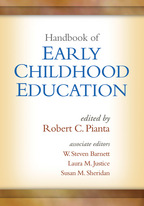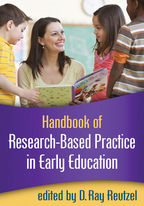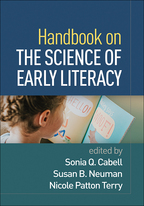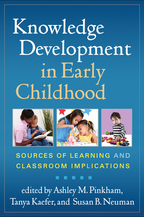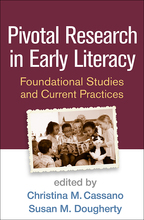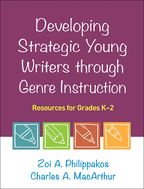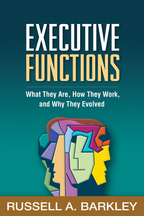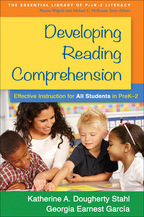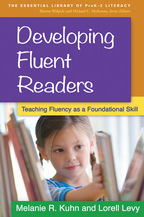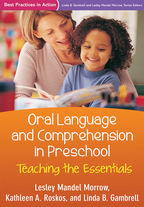Handbook of Early Childhood Education
Edited by Robert C. Pianta
Associate Editors: W. Steven Barnett, Laura M. Justice, and Susan M. Sheridan
HardcoverPaperbacke-bookprint + e-book
Hardcover
orderMarch 16, 2012
ISBN 9781462503377
Price: $108.00 634 Pages
Size: 7" x 10"
Paperback
orderAugust 12, 2015
ISBN 9781462523733
Price: $72.00634 Pages
Size: 7" x 10"
“At a time when there are quite vocal challenges to the wisdom of providing early care and education to children and families in need, Pianta and his coeditors have assembled leaders in the field to report on the state of the science and practice. This comprehensive handbook conveys current knowledge about all dimensions of early childhood education: its history, developmental processes that underlie practices, exemplary instruction, and systems to put practices in place in states and communities. The Handbook is the definitive work of its kind and will be a great resource for practitioners, policymakers, and education scientists.”

—Samuel L. Odom, PhD, Director, Frank Porter Graham Child Development Institute, University of North Carolina at Chapel Hill
“I used this book as a text in our introductory Trends and Issues course for new PhD students. Student feedback was outstandingly positive. The book has a wonderful combination of breadth and depth. It exposes students to a variety of topics for future study and research. I will use the text in this course again next Spring.”

—M. Susan Burns, PhD, College of Education and Human Development, George Mason University
“Early childhood education has seen a dramatic explosion of research and programs over the past 20 years. This handbook not only examines the research of the past, it anticipates what we may discover in the future. Taken as a whole, these chapters address one of the most important questions we face as a nation: 'How can we improve the lives of children and families—particularly those living in poverty or those raising children under challenging conditions?'”

—Samuel J. Meisels, EdD, President, Erikson Institute
“The editors have assembled an outstanding handbook at the nexus of practice, policy, and research in early childhood education, one that captures the contemporary realities of this fast-moving, multidisciplinary field. The 27 chapters synthesize the knowledge base across four themes: early education opportunities, the impact of instruction and curriculum, developmental processes in early childhood, and building an effective early education system. The result is a tour de force because the individual authors do more than summarize—they write to forge connections between science and the education sector. This important volume is essential reading for students, researchers, practitioners, and policymakers.”

—Kathleen McCartney, PhD, Dean, and Gerald S. Lesser Professor in Early Childhood Development, Harvard Graduate School of Education
“This handbook accomplishes two impressive feats. It brings together in one place a rich array of chapters that reflect the contemporary realities and knowledge base in early childhood education—and the writing is consistently clear and crisp. The volume promises to become a definitive reference and required reading for researchers, policymakers, program administrators, and students in early childhood education.”

—Deborah Lowe Vandell, PhD, Professor and Chair of Education, University of California, Irvine
“This handbook signals a new era—one in which early education is the foundation of a transformed public education system in the United States. Chapters on policy set the stage for the focus on learning and instruction, bolstered by chapters on development and on serving diverse learners. This volume will become an essential part of the preparation of educators, researchers, and policymakers striving to create a 21st-century education system that promises equality of opportunity for all children.”

—Ruby Takanishi, PhD, President and CEO, Foundation for Child Development, New York
—Samuel L. Odom, PhD, Director, Frank Porter Graham Child Development Institute, University of North Carolina at Chapel Hill
“I used this book as a text in our introductory Trends and Issues course for new PhD students. Student feedback was outstandingly positive. The book has a wonderful combination of breadth and depth. It exposes students to a variety of topics for future study and research. I will use the text in this course again next Spring.”
—M. Susan Burns, PhD, College of Education and Human Development, George Mason University
“Early childhood education has seen a dramatic explosion of research and programs over the past 20 years. This handbook not only examines the research of the past, it anticipates what we may discover in the future. Taken as a whole, these chapters address one of the most important questions we face as a nation: 'How can we improve the lives of children and families—particularly those living in poverty or those raising children under challenging conditions?'”
—Samuel J. Meisels, EdD, President, Erikson Institute
“The editors have assembled an outstanding handbook at the nexus of practice, policy, and research in early childhood education, one that captures the contemporary realities of this fast-moving, multidisciplinary field. The 27 chapters synthesize the knowledge base across four themes: early education opportunities, the impact of instruction and curriculum, developmental processes in early childhood, and building an effective early education system. The result is a tour de force because the individual authors do more than summarize—they write to forge connections between science and the education sector. This important volume is essential reading for students, researchers, practitioners, and policymakers.”
—Kathleen McCartney, PhD, Dean, and Gerald S. Lesser Professor in Early Childhood Development, Harvard Graduate School of Education
“This handbook accomplishes two impressive feats. It brings together in one place a rich array of chapters that reflect the contemporary realities and knowledge base in early childhood education—and the writing is consistently clear and crisp. The volume promises to become a definitive reference and required reading for researchers, policymakers, program administrators, and students in early childhood education.”
—Deborah Lowe Vandell, PhD, Professor and Chair of Education, University of California, Irvine
“This handbook signals a new era—one in which early education is the foundation of a transformed public education system in the United States. Chapters on policy set the stage for the focus on learning and instruction, bolstered by chapters on development and on serving diverse learners. This volume will become an essential part of the preparation of educators, researchers, and policymakers striving to create a 21st-century education system that promises equality of opportunity for all children.”
—Ruby Takanishi, PhD, President and CEO, Foundation for Child Development, New York

